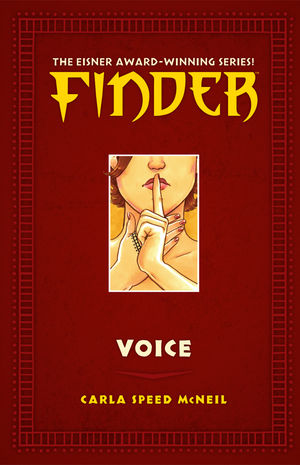- Comics
- Comics Reviews
- Manga
- Comics Reviews
- European Comics
- News
- Comics News
- Press Releases
- Columns
- Spotlight
- Digital Comics
- Webcomics
- Cult Favorite
- Back Issues
- Webcomics
- Movies
- Toys
- Store
- More
- About
By Leroy Douresseaux
March 23, 2011 - 08:39
 |
| Finder: Voice cover image |
Carla Speed McNeil has been producing her comic book (now webcomic), Finder, which she describes as “aboriginal science fiction,” since 1996. McNeil self-published the Finder comic book series through her company, Lightspeed Press, for 38 issues. Finder the webcomic is available on the publisher’s website.
Dark Horse has just published the most recent Finder graphic novel/story arc in a trade paperback entitled Finder: Voice. Finder takes place in the far distant future, on a vastly depopulated Earth. The series is set primarily in domed city-states that are dominated by wealthy clans. In the lands outside the domes, various hunter-gatherer cultures thrive.
Voice is set in the domed city of Anvard, where society is dominated by an intricate network of clans, including the flamboyant Llaverac. Rachel Grosvenor is Llaverac on her mother’s side and Medawar (another clan) on her father’s side. Now, Rachel is in the midst of the 557th Annual Llaverac Clan Confirmation Competition. Winning or finishing near the very top means that Rachel will be formally welcomed into the clan, which will secure her and her family’s future. A mugging and the theft of a priceless and indispensable family heirloom wrecks her chances. Rachel’s hunt for the heirloom sends her spiraling into Anvard’s dark underbelly (the other side of the tracks, so to speak), and a legendary Finder may hold the key to her future. But can Rachel find the Finder?
There are many things that stand out about Carla Speed McNeil’s work on Finder: the deft handling of a huge ensemble cast, the intricate character relationships, the complex internal mythology, etc. What always stands out to me is how expressive her art is. Comics are a visual storytelling medium, of course, but that is a rather simplistic way of looking at the medium. Comics use graphics that include drawings, sound effects, word balloons, captions, lettering, etc. to not only tell a story, but to also convey a range of emotions, as well as establish settings, moods, and time periods.
As a whole, McNeil’s graphic storytelling is lush and highly-detailed. It is a meticulous graphical symphony of sights, sounds, smells, and sensations, if not tastes. A reader can break down the composition of each panel and see that every line is a conveyance. The flowing drapery informs the readers of the opulence and importance of the clan confirmation competition. Heavy word balloons carry the weight of angry words. Swaying brush strokes suggest the wild and fevered rhythm of Ascian dance. Grassy cross-hatching unveils the lavish, stately home that marks Rachel’s victory.
Finder is the little independent, self-published comic book that is a great, big old science fiction comic book. Through her vivid, expressive storytelling, Carla Speed McNeil presents a world that is at once familiar and old, but also brand new. Finder is a ticket to adventure through a mesmerizing, new science fiction world.
A